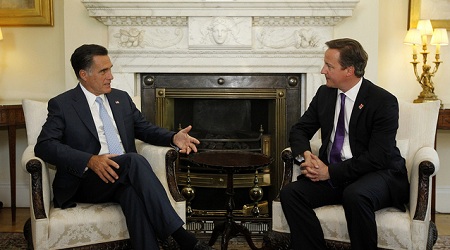Mitt Romney’s debut on the world stage is off to a bad start. ![]()
![]()
It’s become a bit of a campaign ritual in the United States for a presidential challenger to go on a mid-summer international trip to showcase the challenger’s ability for diplomacy in anticipation that the challenger may become the president of the United States — as executed ambitiously by Barack Obama’s July 2008 trip to Kuwait, Afghanistan, Iraq, Jordan, Israel, England, France and Germany. (In Berlin, he even held a huge rally that drew thousands.)
Romney, the Republican nominee for president in the United States now challenging Obama, is currently on a tour to the United Kingdom, Poland and Israel. The trip to the UK, in particular, as the 2012 Olympic Games open in London, was designed to highlight Romney’s role leading the Winter Olympics in 2002 in Salt Lake City.
He had already annoyed Obama supporters yesterday when his aides awkwardly asserted that Romney’s “Anglo-Saxon heritage” would somehow help him understand better the “special relationship” that both Americans and the British so fondly fete:
“We are part of an Anglo-Saxon heritage, and he feels that the special relationship is special,” the Telegraph quoted the adviser as saying, “The White House didn’t fully appreciate the shared history we have.”
Although the Romney camp likely meant to highlight that he would be a more “Atlanticist” president than Obama (whose foreign policy emphasis has been more on China and the Pacific than many of his predecessors), there were no mistaking the awkward racial overtones in the criticism of the United States’s first non-white president.
He then mistakenly referred to Ed Miliband, the leader of the UK’s Labour Party, as “Mr. Leader.”
But the real shocker has come today, when Romney not-so-subtly hinted that the Olympics aren’t assured of success and that some difficulties in preparations had been “disconcerting.” British prime minister David Cameron, himself beleaguered by a sinking double-dip recession and a phone-hacking scandal that has enveloped some of his closest aides, snarked back:
“We are holding an Olympic Games in one of the busiest, most active, bustling cities anywhere in the world. Of course it’s easier if you hold an Olympic Games in the middle of nowhere,” an allusion to Salt Lake City, which hosted Games that Mr. Romney oversaw.
Ouch!
The sharp reply led The New York Times to declare a new Olympic event: Romney vs. Cameron. It’s unimaginable that he can do much worse in Israel or in Poland (a country about which Obama served up a bit of an international gaffe himself in May).
The right-leaning Daily Telegraph blew off Romney in a scathing commentary:
Mitt Romney is perhaps the only politician who could start a trip that was supposed to be a charm offensive by being utterly devoid of charm and mildly offensive.
Whoops!
You might think that Romney and Cameron, who share the same center-right ideological space, would be fast friends. But if they don’t seem quite simpatico, it won’t be the first time that the British right and American right have found themselves at contretemps.
Although Obama and Cameron do not see eye-to-eye on the politics of austerity, they were very much in sync over NATO’s concerted efforts to bolster rebels in Libya last year in the effort to oust long-time strongman Muammar Gaddafi.
While former Labour British prime minister Tony Blair got along very well with Democratic president Bill Clinton, he got along even better with Republican president George W. Bush, who himself had little time for the string of less-than-impressive leaders of the UK’s Conservative Party in the mid-2000s. Blair and Bush together championed the now-controversial 2003 war to oust Saddam Hussein in Iraq, on the basis of threats of weapons of mass destruction that never surfaced, a war that is now central to the legacy of both.
Republican president Ronald Reagan and Tory prime minister Margaret Thatcher were both heralds of a new, more anti-government conservatism. But historical archives show they had very different incentives during the end of the Cold War — Reagan welcomed the fall of the Berlin Wall and the collapse of the Soviet Union; Thatcher feared the reunification of Germany. Likewise, Labour prime minister Harold Wilson refused to go along in the 1960s with Democratic president Lyndon B. Johnson in the American escalation in the war on Vietnam.
While a string of gaffes won’t necessarily affect future Romney-Cameron dialogues, it makes for an awkward — if not quite unprecedented — start to a potential new chapter in those particularly ‘special’ relationships between American presidents and British prime ministers.
